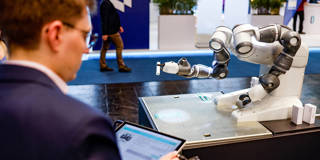As artificial intelligence reduces demand for labor and boosts productivity, governments and businesses are going to have to adjust. While governments might want to raise taxes and redistribute the revenues in order to mitigate the short-term disruption, in the long term, they will need to think bigger.
LONDON – In April, Alphabet CEO Sundar Pichai predicted that artificial intelligence would have an impact “more profound” than any other human innovation, from fire to electricity. While it is impossible to know precisely what that impact will be, two changes appear particularly likely: demand for labor will fall, and productivity will rise. In other words, we appear to be moving toward a labor-less economic model, in which fewer human workers are needed to sustain growth.

LONDON – In April, Alphabet CEO Sundar Pichai predicted that artificial intelligence would have an impact “more profound” than any other human innovation, from fire to electricity. While it is impossible to know precisely what that impact will be, two changes appear particularly likely: demand for labor will fall, and productivity will rise. In other words, we appear to be moving toward a labor-less economic model, in which fewer human workers are needed to sustain growth.